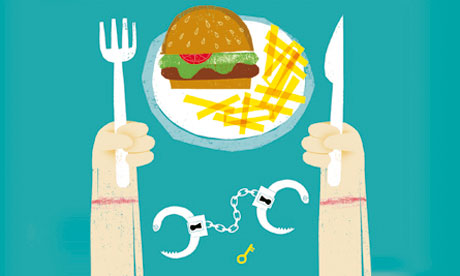
Recently, I've been looking into WeightWatchers. To anyone familiar with my gangly frame, this might seem unwarranted: I may have numerous problems, but excess poundage isn't one of them. Still, the enthusiastic testimonies of two intelligent friends – not the types to be seduced by The Parsnips-Only Diet, or Eat Like Alec Baldwin – had me wondering: could its principles be useful in other areas of life? Successful systems of habit change are sufficiently rare to be worth scrutinising, whatever their origins. Anyway, give me a few more years and I'll probably need the weight-loss tips, too.
When WeightWatchers works – and the Medical Research Council, among others, argues that it does – it's surely for several reasons, including structure and social support. But one key way in which it differs from most diets is that no food's banned outright: each has a point score, and participants have a daily points target, along with extra points they're free to "spend" as they like across the week. (Points can also be "earned" by exercising.) WeightWatchers has patented its points formula, and sends heavy-handed legal letters to those who purport to reveal it. But behind the secrecy lies a powerful insight: allowing people a feeling of autonomy – letting them allocate points, rather than insisting on rigid meal plans – makes it far likelier that they'll stick to the programme.
Social psychologists agree on few things so unanimously as that we need this feeling of autonomy in order to thrive. Research, for example, indicates it's not stress per se so much as stress we can't control that causes health problems – a finding that's held firm across studies of British civil servants, cocaine-injected rats, and more besides. Yet too often we try to change ourselves, or others, by denying that autonomy ("I'll stop eating red meat!", "All staff must be at their desks by 8.30am!"), against which, craving a sense of independence, we rebel.
The twin lessons of WeightWatchers are, first, that this feeling of autonomy is crucial, but second that it's strikingly easy to manipulate. After all, the points system, while not a straitjacket, is still pretty strict – yet it's the wiggle-room that makes the difference. It's worth considering whether you could invent similar points-based schemes for other personal goals (exercise, hours worked, alcohol consumed), aiming for a maximum or minimum weekly score, rather than total bans or every-single-day targets. The implications for parents and managers are clear, too: cater to this need, with flexible rules, and you might be surprised how easy it is to get your own way. Personally, I'm astonished at how tiny a dose of autonomy transforms my mood. Since I stopped working from an office, I'm no less busy, and only marginally freer to choose my work – yet, perhaps slightly pathetically, the freedom to choose exactly where and when I start each morning turns out to be vastly important.
There's a sinister political implication to the idea that our thirst for freedom is so easily quenched. It calls to mind the argument that consumer capitalism lulls us into compliance by offering the illusion of choice among products that are really only (to borrow Theodor Adorno's phrase) "pseudo-individualised", and which all help bolster the system. We can, it seems, be bought off with the most superficial autonomy. In a broader sense, that's deeply alarming. In a narrower one, it might help you lose weight. Tricky.
oliver.burkeman@theguardian.com
twitter.com/oliverburkeman

